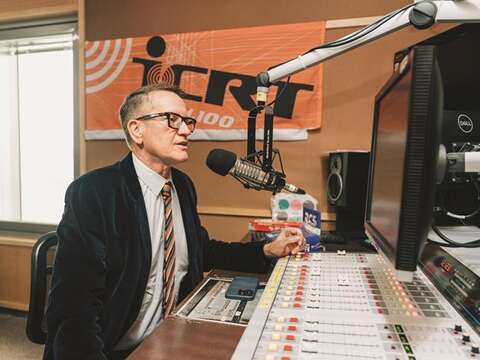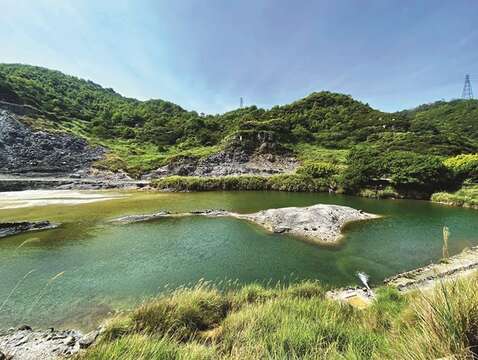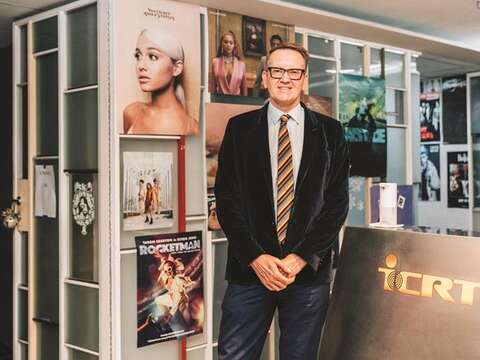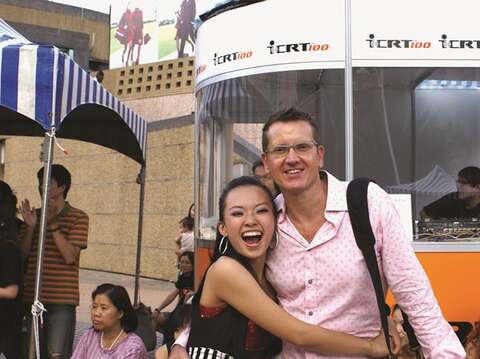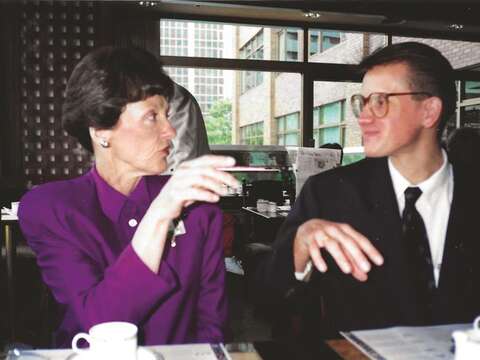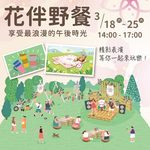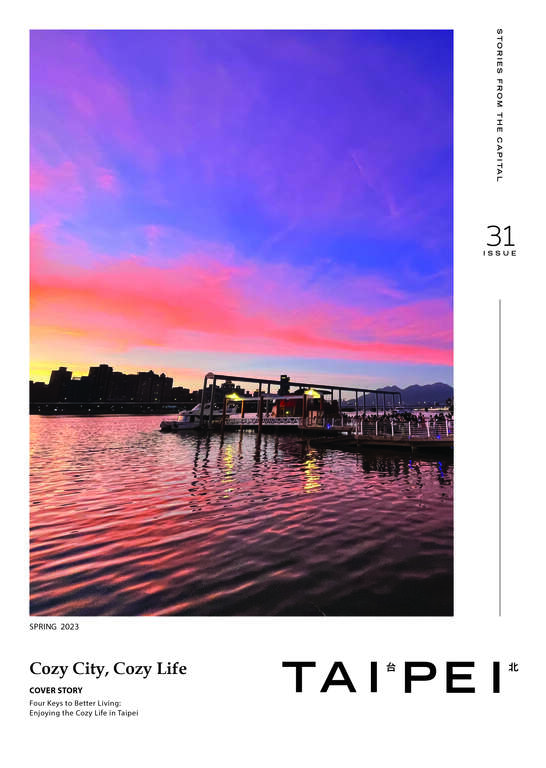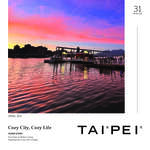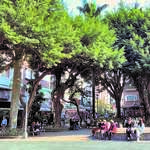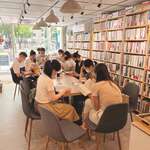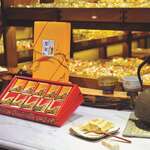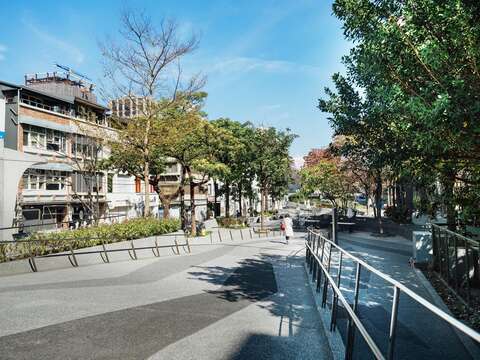Post date:2023-03-14
744
TAIPEI #31 (2023 Spring)
Taipei Through a Radio Man’s Eyes
Author Kuan Yuan Chu
Photographer Samil Kuo, Yi Wen Tsao, Taiwan Scene, Tim Berge
In 2022, Taipei was listed as the 10th most livable city by lifestyle magazine Monocle. This may help to explain the fact that there are now around 70,000 foreign residents from all over the world living in Taipei City, according to the most recent statistics from the National Immigration Agency (內政部移民署). Among these tens of thousands, Tim Berge (白健文), General Manager of International Community Radio Taipei (ICRT), is an outstanding example of people from overseas rooting themselves permanently in Taipei.
Berge strikes an air of elegance and chic style, with a tall and slim figure, wearing a black blazer and a handsome tie from Paul Smith, a brand he says he would wear every day if he could. However, when the interaction begins, people may be surprised by how Taiwanese he is, with his warm, friendly attitude and native-like Mandarin, which perfectly reveals the fact that he has spent more than 30 years in Taiwan.
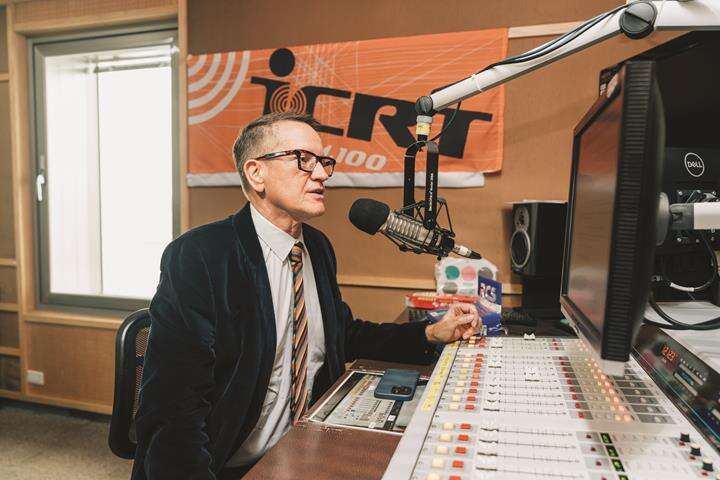 ▲Tim Berge, General Manager of ICRT, has witnessed the development and transformation of Taipei City and its media industry over the past three decades.
▲Tim Berge, General Manager of ICRT, has witnessed the development and transformation of Taipei City and its media industry over the past three decades.
First Impressions of Taiwan
Although Berge grew up in Minneapolis, Minnesota, a state far from the blue waters of the Pacific, he still had the chance to hear a lot of fascinating facts about East Asia from the traveling missionaries who spread the word of their faith worldwide. As a result, Berge began to be aware that there was a small island called Taiwan somewhere out there in the vast sea.
This contributed to Berge growing an interest in East Asian culture, which in turn gave rise to his future decision to settle in Taipei. Indeed, he even chose Mandarin and Russian as his foreign languages to learn at university. “At that time, other people asked me, ‘Are you a Communist?’” Berge recalls, laughing.
To improve his Chinese, Berge joined a study abroad program at university, which brought him to Hong Kong for a year. During the summer break, Berge decided to travel to Taiwan to visit the missionaries who had previously brought him many stories from foreign shores, to really experience the life that he could once only imagine. In 1979, Berge took a flight to Taipei and set foot on Taiwanese soil for the first time.
When asked about his first impression when he arrived in Taiwan, as compared to his experience in Hong Kong, Berge says, “I felt that Taiwan is really good; the feeling Taiwan brought to me is more real.”
Berge further points out one problem of Hong Kong, in his mind, is that people overemphasize the idea of the pecking order, as well as the social and economical status of others. According to Berge, the genuine connection between people makes Taiwan a more interesting place to stay.
Getting Involved in Taiwanese Culture
And so, with a good first impression and the hope of finding a better Mandarin learning environment, Berge came to Taipei, joining the Mandarin program at National Taiwan Normal University (NTNU) in 1981. Afterward, he decided to work in Taiwan, starting in 1988.
Still, Berge endured forms of cultural and environmental shock when he first settled in Taiwan. “What am I doing?” was the thought running through his mind, he recalls, when he traveled from the airport in Taoyuan (桃園) to Taipei. At that time, Taiwan was a place with dangerous traffic, and the weather was such an affront to his body that for a time he had health issues every single day. Furthermore, martial law was in effect. Berge still remembers the closed feeling in local society, owing to the presence of fear in people’s everyday lives. “Young Taiwanese people my age would not dare to go to the places where they can dance and drink,” Berge says.
After starting work in Taiwan, the office culture was actually annoying for Berge, as he quickly found that everybody is somewhat obsequious to their superiors. “I think it is OK to say nice words,” he says, but when it comes to over-flattering, he shares with us a pearl of wisdom from his mother. “If you do not have nice words to say, do not say anything; you just tiam-tiam (be quiet in Taiwanese),” Berge says, uttering a word that many Taiwanese will be surprised to hear from the mouth of a foreigner.
Another thing Berge found somewhat strange is the fact that Taiwanese workers often take a nap during their lunch break. “For us American dudes, we will think, ‘Are you really that tired? Have you slept at night?’” Berge laughs. “In the U.S., you just continue your work after you grab something to eat!”
But for Berge, these issues passed with time. He joined ICRT, and began his career in the broadcasting industry in 1991.
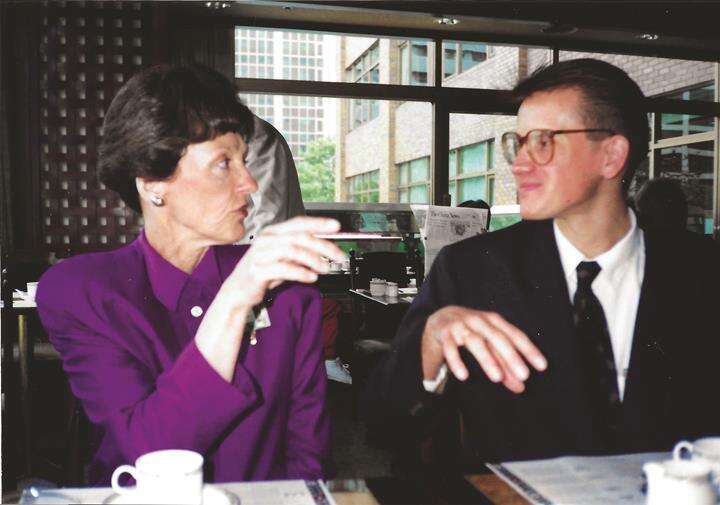 ▲Berge talked with Joan Mondale, wife of former U.S. Vice President Walter F. Mondale, in the Howard Plaza Hotel (福華大飯店) while her visit to facilitate cultural exchanges in Taipei. (Photo/Tim Berge)
▲Berge talked with Joan Mondale, wife of former U.S. Vice President Walter F. Mondale, in the Howard Plaza Hotel (福華大飯店) while her visit to facilitate cultural exchanges in Taipei. (Photo/Tim Berge)
Traffic Reporter’s Close Observation
When he started working in radio, Berge was responsible for doing bilingual traffic reports (using his fluent English and Mandarin) in the evenings, and was given a cute nickname — Captain Tim. When asked about the traffic in Taipei in years past, he says frankly, “It was really terrible. Sometimes the traffic would be stuck for a really long time.”
According to Berge, traffic in Taipei was awful compared to nowadays, which is described by him as “much better,” with the improvement owing to the MRT. However, one good thing was that the awful traffic, bad as it was, was predictable. Sometimes, if he could not get the current information in time for his spot, with methods that look old-school nowadays, such as making calls to traffic divisions of police departments and government traffic bureaus, or even listening to other radio stations, he would just go with what he knew. “At the end of the day, the place that always has a traffic jam will have a traffic jam. I just said the things in my mind, but I was always right.”
This was a time when there was no Google and the cellphone was not invented yet. The only thing people could rely on for setting a meeting was to show up at the agreed place and time, and hope their counterpart would do the same. “An hour late was actually really reasonable,” Berge remembers.
Tackling a Shifting Media Ecology
“I know who you are,” is a phrase Berge heard a lot after he spoke at social occasions when he was younger. It was the time when people had only a few options when it came to consuming media, and ICRT was the only choice for Western music, thus making Berge’s voice instantly recognizable.
Nowadays, with many more radio stations and other mediums to choose from, ICRT is not as dominant as it once was. Berge often goes to schools to give talks, and university students in the audience rarely know what a radio is. If some of them do listen to the radio, they listen passively in places like their parents’ car instead of turning on the radio themselves. “There are two trends of broadcasting audiences,” Berge points out. “One is that the audiences have become fewer, the other is that the listeners are becoming older and older.”
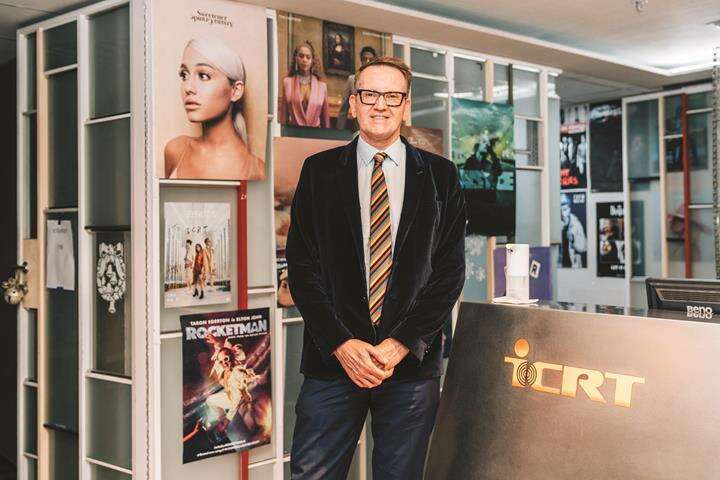 ▲From bilingual traffic reporter to general manager, Berge has always enjoyed his work and facing new challenges.
▲From bilingual traffic reporter to general manager, Berge has always enjoyed his work and facing new challenges.
In this context, how to increase the exposure of the station and its content has become the issue Berge has had to tackle. With him at the helm, ICRT is always transforming according to new media trends. They now put their effort into extending the content of ICRT to other mediums such as apps, Podcasts, or even social media like Facebook and Instagram.
“Cross-platform, cross-promotions, cross-media,” Berge indicates. Instead of seeing broadcasting as only one medium, he thinks people should see it as any kind of audio content, and they can penetrate into and circulate among all media fields. As such, work at the station goes way beyond simply recording the programs, extending to finding ways to promote content on other mediums or even holding live events outside the studio. Seeing this trend, Berge laughs, “Sometimes I think technology is not here to save us. Instead, people are serving these technologies. It is very scary.”
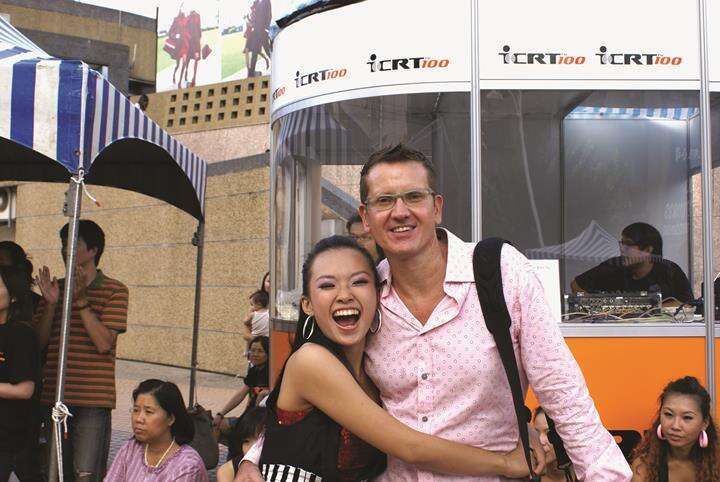 ▲Besides broadcasting radio programs, Berge extends his job outside the studio such as holding music events ICRT Battle of the Bands, and broadcasting the winner’s music on their station. (Photo/Tim Berge)
▲Besides broadcasting radio programs, Berge extends his job outside the studio such as holding music events ICRT Battle of the Bands, and broadcasting the winner’s music on their station. (Photo/Tim Berge)
Building Bridges with Language and Culture
Berge believes that the English-speaking station he is working for helps the audience become more connected to the world. Firstly, in Berge’s opinion, listening to English radio is a really good way to improve one’s English skills. “The words spoken on radio stations are really useful in real life,” he says. Compared with other forms of media such as movies and TV series, not only are the issues discussed on the radio more connected to real life, but the words coming from the radio will be the ones that can be commonly applied to most daily occasions properly.
Secondly, Berge and his team create their content based on a decidedly Taiwanese angle, and they choose content that is related to Taiwanese people so that not only is the programming closer to the listeners’ lives, but Taiwanese listeners can also be equipped with the ability to talk about Taiwanese issues in English.
Embracing an Ordinary but Healthy Lifestyle in Taipei
Since his first day working in Taipei, the green of Yangmingshan and Beitou captured Berge’s heart, and he has lived in the area ever since, although the station he works at moved to another area more than two decades ago. “I really like Beitou, since it is close to the mountain, with a really good environment. The air is really clean. I can hear the birds singing beautifully and wake up surrounded by all the green plants outside every morning. These make me feel very comfortable,” Berge explains.
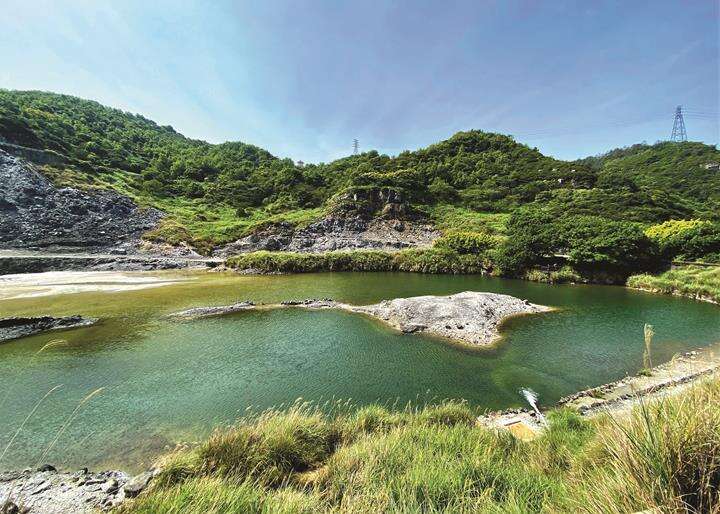 ▲Berge adores the green environment of Beitou, where he has long settled and enjoyed his life in Taipei. (Photo/Yi Wen Tsao)
▲Berge adores the green environment of Beitou, where he has long settled and enjoyed his life in Taipei. (Photo/Yi Wen Tsao)
Regarding gastronomy in Taipei, Berge’s favorites are the small restaurants spread throughout the city, especially the ones he has visited for years and developed emotional links with. “Like if I want to eat beef noodles, I will go to Zhongzheng District’s Taoyuan Street (桃源街) or Daan District’s Yongkang Street (永康街), because there are good beef noodle restaurants to choose from. Or eat dumplings at Zhongzheng District’s Dragon Inn Dumplings (龍門客棧餃子館).” He also expresses his sadness, as some of the old restaurants have closed in recent years. “I always feel it is a shame, since there are really a lot of delicious foods in Taiwan,” Berge says.
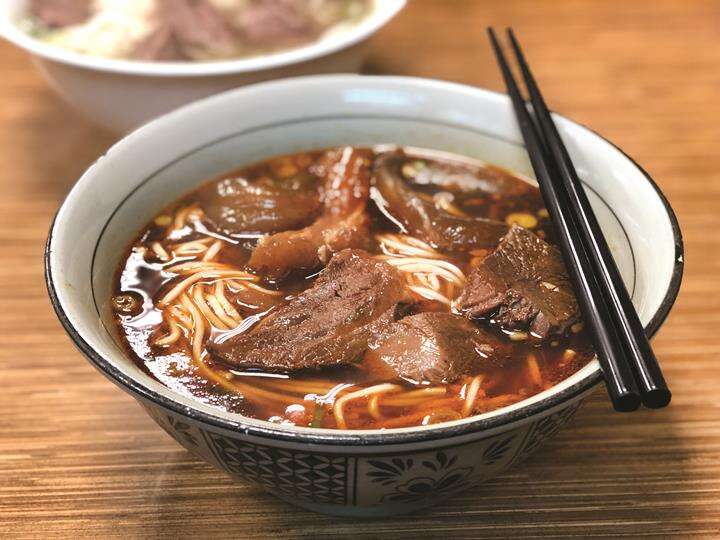 ▲One of the Taiwanese foods that Berge likes to eat in Taipei is beef noodles. (Photo/Taiwan Scene)
▲One of the Taiwanese foods that Berge likes to eat in Taipei is beef noodles. (Photo/Taiwan Scene)
About his typical day in Taipei, Berge smiles and says, “I am boring. I do the same thing every day.” Every morning he drinks coffee and reads the news, then goes out jogging and exercising for around an hour before he goes to the radio station. It may look repetitive, but this healthy lifestyle is reflected in his energetic, youthful look. Upon seeing the surprised face of the interviewer when he reveals he is more than 60 years old, Berge laughs and shares his simple secret: “exercise.”
Favorite Features of Taipei
The variety of cultures and the distinct but charming weather of the four seasons are the reasons why Berge continues to make Taipei his home. Compared with his cold hometown of Minneapolis and the year-round warmth of southern Taiwan, Taipei is preferable in this aspect, Berge finds. “It is super hot to wear a suit in southern Taiwan. I cannot stand it, but I like to wear a suit.”
After living in Taipei for more than three decades and enjoying the local food, sometimes Berge still likes to treat himself to a wonderful Western meal or enjoy cooking at home. Fortunately, Taipei is convenient for both. As a media personality, Berge also enjoys watching movies or other performances, and Taipei is a city where a variety of art events, both local and international, are held. “Taipei is a more international city,” he adds of how things have changed since he first arrived.
One unique point of Taipei compared to other cities, in Berge’s mind, is that Taipei is an approachable city, friendly and welcoming to all kinds of visitors. “I think in cities such as Hong Kong, New York and London, if you have money it is a great place to live, but if you are poor then it is a totally different story. But the good thing about Taipei is that if you are not rich, you can still find a good, proper place to stay,” Berge says. He believes Taiwan is a place that is more suitable for people to live, compared with other cosmopolitan centers mentioned earlier. No matter which social class people may belong to, they can all have a decent quality of life.
Taipei Through a Radio Man’s Eyes
Author Kuan Yuan Chu
Photographer Samil Kuo, Yi Wen Tsao, Taiwan Scene, Tim Berge
In 2022, Taipei was listed as the 10th most livable city by lifestyle magazine Monocle. This may help to explain the fact that there are now around 70,000 foreign residents from all over the world living in Taipei City, according to the most recent statistics from the National Immigration Agency (內政部移民署). Among these tens of thousands, Tim Berge (白健文), General Manager of International Community Radio Taipei (ICRT), is an outstanding example of people from overseas rooting themselves permanently in Taipei.
Berge strikes an air of elegance and chic style, with a tall and slim figure, wearing a black blazer and a handsome tie from Paul Smith, a brand he says he would wear every day if he could. However, when the interaction begins, people may be surprised by how Taiwanese he is, with his warm, friendly attitude and native-like Mandarin, which perfectly reveals the fact that he has spent more than 30 years in Taiwan.
 ▲Tim Berge, General Manager of ICRT, has witnessed the development and transformation of Taipei City and its media industry over the past three decades.
▲Tim Berge, General Manager of ICRT, has witnessed the development and transformation of Taipei City and its media industry over the past three decades.First Impressions of Taiwan
Although Berge grew up in Minneapolis, Minnesota, a state far from the blue waters of the Pacific, he still had the chance to hear a lot of fascinating facts about East Asia from the traveling missionaries who spread the word of their faith worldwide. As a result, Berge began to be aware that there was a small island called Taiwan somewhere out there in the vast sea.
This contributed to Berge growing an interest in East Asian culture, which in turn gave rise to his future decision to settle in Taipei. Indeed, he even chose Mandarin and Russian as his foreign languages to learn at university. “At that time, other people asked me, ‘Are you a Communist?’” Berge recalls, laughing.
To improve his Chinese, Berge joined a study abroad program at university, which brought him to Hong Kong for a year. During the summer break, Berge decided to travel to Taiwan to visit the missionaries who had previously brought him many stories from foreign shores, to really experience the life that he could once only imagine. In 1979, Berge took a flight to Taipei and set foot on Taiwanese soil for the first time.
When asked about his first impression when he arrived in Taiwan, as compared to his experience in Hong Kong, Berge says, “I felt that Taiwan is really good; the feeling Taiwan brought to me is more real.”
Berge further points out one problem of Hong Kong, in his mind, is that people overemphasize the idea of the pecking order, as well as the social and economical status of others. According to Berge, the genuine connection between people makes Taiwan a more interesting place to stay.
Getting Involved in Taiwanese Culture
And so, with a good first impression and the hope of finding a better Mandarin learning environment, Berge came to Taipei, joining the Mandarin program at National Taiwan Normal University (NTNU) in 1981. Afterward, he decided to work in Taiwan, starting in 1988.
Still, Berge endured forms of cultural and environmental shock when he first settled in Taiwan. “What am I doing?” was the thought running through his mind, he recalls, when he traveled from the airport in Taoyuan (桃園) to Taipei. At that time, Taiwan was a place with dangerous traffic, and the weather was such an affront to his body that for a time he had health issues every single day. Furthermore, martial law was in effect. Berge still remembers the closed feeling in local society, owing to the presence of fear in people’s everyday lives. “Young Taiwanese people my age would not dare to go to the places where they can dance and drink,” Berge says.
After starting work in Taiwan, the office culture was actually annoying for Berge, as he quickly found that everybody is somewhat obsequious to their superiors. “I think it is OK to say nice words,” he says, but when it comes to over-flattering, he shares with us a pearl of wisdom from his mother. “If you do not have nice words to say, do not say anything; you just tiam-tiam (be quiet in Taiwanese),” Berge says, uttering a word that many Taiwanese will be surprised to hear from the mouth of a foreigner.
Another thing Berge found somewhat strange is the fact that Taiwanese workers often take a nap during their lunch break. “For us American dudes, we will think, ‘Are you really that tired? Have you slept at night?’” Berge laughs. “In the U.S., you just continue your work after you grab something to eat!”
But for Berge, these issues passed with time. He joined ICRT, and began his career in the broadcasting industry in 1991.
 ▲Berge talked with Joan Mondale, wife of former U.S. Vice President Walter F. Mondale, in the Howard Plaza Hotel (福華大飯店) while her visit to facilitate cultural exchanges in Taipei. (Photo/Tim Berge)
▲Berge talked with Joan Mondale, wife of former U.S. Vice President Walter F. Mondale, in the Howard Plaza Hotel (福華大飯店) while her visit to facilitate cultural exchanges in Taipei. (Photo/Tim Berge) Traffic Reporter’s Close Observation
When he started working in radio, Berge was responsible for doing bilingual traffic reports (using his fluent English and Mandarin) in the evenings, and was given a cute nickname — Captain Tim. When asked about the traffic in Taipei in years past, he says frankly, “It was really terrible. Sometimes the traffic would be stuck for a really long time.”
According to Berge, traffic in Taipei was awful compared to nowadays, which is described by him as “much better,” with the improvement owing to the MRT. However, one good thing was that the awful traffic, bad as it was, was predictable. Sometimes, if he could not get the current information in time for his spot, with methods that look old-school nowadays, such as making calls to traffic divisions of police departments and government traffic bureaus, or even listening to other radio stations, he would just go with what he knew. “At the end of the day, the place that always has a traffic jam will have a traffic jam. I just said the things in my mind, but I was always right.”
This was a time when there was no Google and the cellphone was not invented yet. The only thing people could rely on for setting a meeting was to show up at the agreed place and time, and hope their counterpart would do the same. “An hour late was actually really reasonable,” Berge remembers.
Tackling a Shifting Media Ecology
“I know who you are,” is a phrase Berge heard a lot after he spoke at social occasions when he was younger. It was the time when people had only a few options when it came to consuming media, and ICRT was the only choice for Western music, thus making Berge’s voice instantly recognizable.
Nowadays, with many more radio stations and other mediums to choose from, ICRT is not as dominant as it once was. Berge often goes to schools to give talks, and university students in the audience rarely know what a radio is. If some of them do listen to the radio, they listen passively in places like their parents’ car instead of turning on the radio themselves. “There are two trends of broadcasting audiences,” Berge points out. “One is that the audiences have become fewer, the other is that the listeners are becoming older and older.”
 ▲From bilingual traffic reporter to general manager, Berge has always enjoyed his work and facing new challenges.
▲From bilingual traffic reporter to general manager, Berge has always enjoyed his work and facing new challenges. In this context, how to increase the exposure of the station and its content has become the issue Berge has had to tackle. With him at the helm, ICRT is always transforming according to new media trends. They now put their effort into extending the content of ICRT to other mediums such as apps, Podcasts, or even social media like Facebook and Instagram.
“Cross-platform, cross-promotions, cross-media,” Berge indicates. Instead of seeing broadcasting as only one medium, he thinks people should see it as any kind of audio content, and they can penetrate into and circulate among all media fields. As such, work at the station goes way beyond simply recording the programs, extending to finding ways to promote content on other mediums or even holding live events outside the studio. Seeing this trend, Berge laughs, “Sometimes I think technology is not here to save us. Instead, people are serving these technologies. It is very scary.”
 ▲Besides broadcasting radio programs, Berge extends his job outside the studio such as holding music events ICRT Battle of the Bands, and broadcasting the winner’s music on their station. (Photo/Tim Berge)
▲Besides broadcasting radio programs, Berge extends his job outside the studio such as holding music events ICRT Battle of the Bands, and broadcasting the winner’s music on their station. (Photo/Tim Berge) Building Bridges with Language and Culture
Berge believes that the English-speaking station he is working for helps the audience become more connected to the world. Firstly, in Berge’s opinion, listening to English radio is a really good way to improve one’s English skills. “The words spoken on radio stations are really useful in real life,” he says. Compared with other forms of media such as movies and TV series, not only are the issues discussed on the radio more connected to real life, but the words coming from the radio will be the ones that can be commonly applied to most daily occasions properly.
Secondly, Berge and his team create their content based on a decidedly Taiwanese angle, and they choose content that is related to Taiwanese people so that not only is the programming closer to the listeners’ lives, but Taiwanese listeners can also be equipped with the ability to talk about Taiwanese issues in English.
Embracing an Ordinary but Healthy Lifestyle in Taipei
Since his first day working in Taipei, the green of Yangmingshan and Beitou captured Berge’s heart, and he has lived in the area ever since, although the station he works at moved to another area more than two decades ago. “I really like Beitou, since it is close to the mountain, with a really good environment. The air is really clean. I can hear the birds singing beautifully and wake up surrounded by all the green plants outside every morning. These make me feel very comfortable,” Berge explains.
 ▲Berge adores the green environment of Beitou, where he has long settled and enjoyed his life in Taipei. (Photo/Yi Wen Tsao)
▲Berge adores the green environment of Beitou, where he has long settled and enjoyed his life in Taipei. (Photo/Yi Wen Tsao) Regarding gastronomy in Taipei, Berge’s favorites are the small restaurants spread throughout the city, especially the ones he has visited for years and developed emotional links with. “Like if I want to eat beef noodles, I will go to Zhongzheng District’s Taoyuan Street (桃源街) or Daan District’s Yongkang Street (永康街), because there are good beef noodle restaurants to choose from. Or eat dumplings at Zhongzheng District’s Dragon Inn Dumplings (龍門客棧餃子館).” He also expresses his sadness, as some of the old restaurants have closed in recent years. “I always feel it is a shame, since there are really a lot of delicious foods in Taiwan,” Berge says.
 ▲One of the Taiwanese foods that Berge likes to eat in Taipei is beef noodles. (Photo/Taiwan Scene)
▲One of the Taiwanese foods that Berge likes to eat in Taipei is beef noodles. (Photo/Taiwan Scene) About his typical day in Taipei, Berge smiles and says, “I am boring. I do the same thing every day.” Every morning he drinks coffee and reads the news, then goes out jogging and exercising for around an hour before he goes to the radio station. It may look repetitive, but this healthy lifestyle is reflected in his energetic, youthful look. Upon seeing the surprised face of the interviewer when he reveals he is more than 60 years old, Berge laughs and shares his simple secret: “exercise.”
Favorite Features of Taipei
The variety of cultures and the distinct but charming weather of the four seasons are the reasons why Berge continues to make Taipei his home. Compared with his cold hometown of Minneapolis and the year-round warmth of southern Taiwan, Taipei is preferable in this aspect, Berge finds. “It is super hot to wear a suit in southern Taiwan. I cannot stand it, but I like to wear a suit.”
After living in Taipei for more than three decades and enjoying the local food, sometimes Berge still likes to treat himself to a wonderful Western meal or enjoy cooking at home. Fortunately, Taipei is convenient for both. As a media personality, Berge also enjoys watching movies or other performances, and Taipei is a city where a variety of art events, both local and international, are held. “Taipei is a more international city,” he adds of how things have changed since he first arrived.
One unique point of Taipei compared to other cities, in Berge’s mind, is that Taipei is an approachable city, friendly and welcoming to all kinds of visitors. “I think in cities such as Hong Kong, New York and London, if you have money it is a great place to live, but if you are poor then it is a totally different story. But the good thing about Taipei is that if you are not rich, you can still find a good, proper place to stay,” Berge says. He believes Taiwan is a place that is more suitable for people to live, compared with other cosmopolitan centers mentioned earlier. No matter which social class people may belong to, they can all have a decent quality of life.
Gallery
:::
Popular articles
 TAIPEI Quarterly 2023 Spring Vol.31
TAIPEI Quarterly 2023 Spring Vol.31 Four Keys to Better Living: Enjoying the Cozy Life in Taipei (TAIPEI Quarterly 2023 Spring Vol.31)
Four Keys to Better Living: Enjoying the Cozy Life in Taipei (TAIPEI Quarterly 2023 Spring Vol.31) Exploring Taipei’s Cool Modern Architecture (TAIPEI Quarterly 2023 Spring Vol.31)
Exploring Taipei’s Cool Modern Architecture (TAIPEI Quarterly 2023 Spring Vol.31) Finding Your Way Through Reading (TAIPEI Quarterly 2023 Spring Vol.31)
Finding Your Way Through Reading (TAIPEI Quarterly 2023 Spring Vol.31) Inclusivity Leading to Win-Win Positivity: Turning Foreign Labor Into a Talent Resource (TAIPEI Quarterly 2023 Spring Vol.31)
Inclusivity Leading to Win-Win Positivity: Turning Foreign Labor Into a Talent Resource (TAIPEI Quarterly 2023 Spring Vol.31) Historic Landmark Bakeries in Taipei (TAIPEI Quarterly 2023 Spring Vol.31)
Historic Landmark Bakeries in Taipei (TAIPEI Quarterly 2023 Spring Vol.31)
 Taipei Through a Radio Man’s Eyes (TAIPEI Quarterly 2023 Spring Vol.31)
Taipei Through a Radio Man’s Eyes (TAIPEI Quarterly 2023 Spring Vol.31)